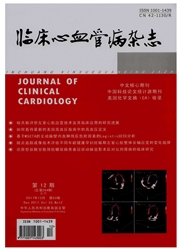

 中文摘要:
中文摘要:
目的:测定不同剂量普罗布考干预后小鼠体内胆固醇逆转运效率,探讨普罗布考影响小鼠体内胆固醇逆转运的机制。方法:32只C57BL/6小鼠随机分为4组,给予不同剂量普罗布考(0,0.1%,0.5%,1%W/W)添加饲料饲养4周后,腹腔注射经ac-LDL及3 H-胆固醇处理过的RAW264.7小鼠巨噬细胞悬液,48h后测定粪便3 H-胆固醇含量。提取肝脏和小肠组织RNA及细胞膜蛋白,分别检测肝脏胆固醇7α羟化酶(CYP7α)、清道夫受体BI(SR-BI)和三磷酸腺苷结合盒转运体(ABCG)5及小肠ABCG5基因与蛋白的表达。结果:①普罗布考干预各组(0.1%,0.5%,1%)小鼠粪便中3 H的总含量显著增多;0.5%与1%普罗布考两组之间差异无统计学意义。②普罗布考干预后肝脏CYP7α、ABCG 5mRNA呈剂量依赖性地表达增多;肝脏、小肠ABCG 5mRNA及其蛋白呈剂量依赖性地表达增加;0.5%与1%普罗布考两组之间差异无统计学意义。③普罗布考干预后肝脏SRBI的mRNA与蛋白表达没有明显变化。结论:普罗布考剂量依赖性地促进小鼠体内巨噬细胞的胆固醇逆转运,其机制可能是通过上调CYP7α、肝脏和小肠ABCG5的表达而发挥作用的。
 英文摘要:
英文摘要:
Objective:To investigate the effect and mechanism of probucol on macrophages reverse cholesterol transport in vivo.Method:The 32male C57BL/6mice were randomly divided into four groups and treated with either vehicle or different dosage(0.1%,0.5%,1% W/W)of probucol respectively for 4weeks,then 3 H-cholesterol-labeled and cholesterol-loaded macrophages were injected intraperitoneally into the mice.The appearances of 3 H-tracer in feces as free cholesterol or bile acids were monitored 48hours later.RNA and membrane protein of the liver and intestine were extracted and the gene and protein expression of SR-BI/CYP7α/ABCG5in liver and ABCG5in intestine were quantified with RT-PCR and Western-blot respectively.Result:①The fecal total 3 H-cholesterol levels were dose-dependently and significantly higher than those in control group,but there was no significant difference between 0.5%and 1% probucol groups.②The mRNA expressions of liver CYP7A1dose-dependently were up-regulated in mice treated with probucol compared with those in control group;The mRNA expression and the protein expression of liver and intestine ABCG5dose-dependently increased also in mice treated with probucol.No significant difference existed between 0.5%and 1% probucol group.③The SR-BI mRNA and protein levels of the liver in mice treated with probucol did not change significantly compared with control mice.Conclusion:Probucol dose-dependently promote macrophages RCT in vivo in mice.The possible mechanism is that probucol upregulate the expression of liver CYP7A1and ABCG5in liver and intestine.
 同期刊论文项目
同期刊论文项目
 同项目期刊论文
同项目期刊论文
 期刊信息
期刊信息
